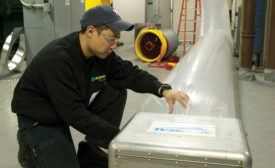Home » energy management
Articles Tagged with ''energy management''
Performance, materials, and cost determine whether ductwork is green
Read More
Energy Efficiency Project Cuts Electric Consumption by Over 6 Percent
The site provided opportunities to supply energy savings improvements across multiple systems
September 21, 2015
Summer Z-Wave Labs Prize Awarded to Smart Energy Startup Embue
Company helps multifamily property managers reduce energy and operational waste
September 9, 2015
ZBB Energy Changes Name to EnSync
Firm says it has rapidly evolved from a battery company to an application solutions company
September 8, 2015
Opower and Nest Score Highest in Assessment of Home Energy Management Vendors
Opower offers leading suite of solutions, Nest expands its home energy management capabilities
September 8, 2015
Distributors Benefit from Regional Standards Sales
Savvy wholesalers are reaping the rewards of stocking up on 13-SEER equipment
Read More
Armstrong Celebrates Energy Program
Planet Proposition initiative enjoys highly successful second year
September 7, 2015
Canada Tops LEED List
Top 10 List highlights sustainable building design, construction, and transformation
September 7, 2015
Report: Solar Prices Continue to Fall
DOE's 'Tracking the Sun' report examines various drivers for PV system prices
September 7, 2015
Yardi Acquires MCEnergy Inc.
Acquisition expands its expertise in energy management services
September 3, 2015
Copyright ©2024. All Rights Reserved BNP Media.
Design, CMS, Hosting & Web Development :: ePublishing




